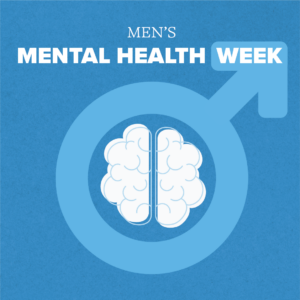 Awareness, prevention, education, and treatment are key aspects for mental health wellness. For men, factors such as social norms, reluctance to seek help, stigma, lack of culturally-competent care, or minimization of symptoms can make it difficult to get treatment for these common mental health problems that are prevalent among men.
Awareness, prevention, education, and treatment are key aspects for mental health wellness. For men, factors such as social norms, reluctance to seek help, stigma, lack of culturally-competent care, or minimization of symptoms can make it difficult to get treatment for these common mental health problems that are prevalent among men.
Depression
Did you know that over 6 million men struggle with depression each year? Depressive symptoms in men often appear as fatigue, irritability and loss or interest or pleasure on work or hobbies rather than sadness and feelings of worthlessness. Adjusting to major life events such as unemployment, relational distress, death/ loss, and health related conditions that affect men such also prostrate and testicular cancer can also contribute to depression.
Here are resources that are specifically focused on men’s health and depression.
https://www.faceitfoundation.org/
https://headsupguys.org/
https://us.movember.com/mens-health/mental-health
Suicide
Men die by suicide more than 4X’s the rate of women, with 79% of suicides completed by men. Gay men (especially those under age 25) and elderly men (especially Caucasian men over the age of 85) are at increased risk. Genetic predisposition, social isolation, substance abuse, unemployment, military trauma, and mood disorders are all identified as risk factors for suicide.
If you are experiencing distress, there are free and confidential supports that can provide support and connection to resources.
https://suicidepreventionlifeline.org/
https://www.glbthotline.org/
https://www.veteranscrisisline.net/
Substance Use
Alcohol dependency impacts 1 in 5 men, with gay men at higher rates of use and military veterans at nearly 2Xs the rate of women. Men are more likely than women to misuse almost all drugs. It is common to struggle with co-morbid mental health and substance misuse such as marijuana with social anxiety, alcohol with depression, and alcohol/ drug use with trauma. Counseling can help address both.
If you are struggling with substance misuse, there are resources available at every stage.
https://www.samhsa.gov/find-help/national-helpline
https://startyourrecovery.org/about-us
Anxiety
Anxiety disorders are the most common mental health disorder among adults 18+ in the United States. More than 40 million adults struggle with an anxiety-related disorder such as generalized-anxiety, social-anxiety, panic-disorder, and phobias . Disorders that equally impact men and women include social anxiety disorder and obsessive-compulsive-disorder.
NAMI has a variety of great support group options, included ones specific to anxiety and panic support.
Bipolar Disorder
Bipolar-disorder affects both men and women at equal rates, with average onset at 16-25 for men. Bipolar disorder affects around 5.7 million adults 18+ in the United States each year within all ages, races, and socio-economic groups. Treatment options, including medication and psychotherapy can help effectively manage manic-or-hypomanic-episodes and major-depressive-episodes.
There are supports available specific to depression and bipolar.
Psychosis and Schizophrenia
Did you know that 90% of the 3.5 million people in the US diagnosed with schizophrenia by age 30 are men? Schizophrenia is considered a serious mental illness that often involves a combination of medication, psychotherapy, and specialty care services to manage symptoms. Delusions, hallucinations, disorganized speech, and difficulties impacting thinking and behavior may be present when symptoms are triggered.
The Schizophrenia and Psychosis Action Alliance offers resources as well as a free information helpline.
Eating Disorders
Approximately 10% of patients with anorexia-nervosa or bulimia are men and 35% with binge-eating-disorder. Men are less likely to seek professional help for an eating disorder.
In addition to the national resources, there are also local center that specialize in treatment for eating disorders.
https://www.nationaleatingdisorders.org/help-support/contact-helpline
https://www.emilyprogram.com/
https://www.healthpartners.com/care/specialty-centers/melrose-center/
Finally, The National Alliance on Mental Illness and Mental Health MN both offer free mental health support and resources.
https://namimn.org/support-resources/
https://mentalhealthmn.org/
I encourage you to take one step closer to increasing your awareness of men’s mental health, utilizing the online resource, hotlines, and local resources.
To schedule an appointment with one of our professional counselors, click here.
Written By: Charlotte Johnson, MA, LPCC
We’re Here to help
Our wellness experts will be happy to take care of you. You can CLICK HERE to schedule an appointment now or call (612)223-8898.
Meet Clinicians
We’re united by our commitment to providing effective, relevant, and innovative mental health support at all stages of your journey. Click Here to find out more about who we are, where we come from, and how we live out CARE’s mission every day.
The professionals at CARE are actively collecting and creating resources to help with what you need. We’re Here for You.



